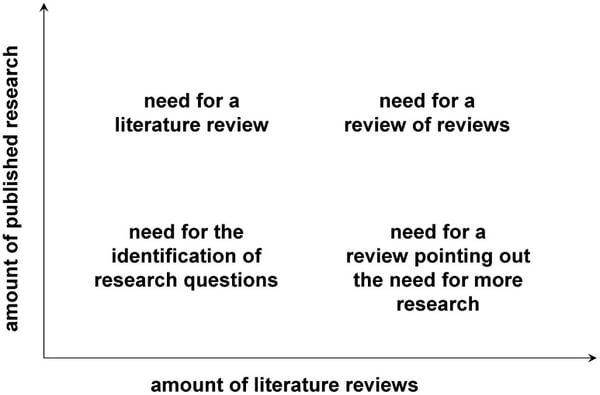The Literature Review
Literature reviews are some of the most widely read and highly cited papers in academia, but writing one can be a daunting task, requiring an expert understanding of the topic at hand. To write a review article is so much more than simply summarizing recent studies published in the field. The most valuable literature reviews, which I find myself going back to again and again, are those that:
- Offer a critical analysis of the published literature
- Focus on changing ideas/new developments in the field
- Consider the controversies and/or conflicting results
- And identify the knowledge gaps
Literature reviews have become increasingly necessary because they allow researchers to keep up with the ever-increasing numbers of papers being published. If you are planning to write one, you might be wondering how or where to begin. Perhaps you are in the middle of one and feeling a little bit off-track.

Defining the Topic
Before tackling a literature review, ask yourself whether there is a need for a review in the first place, and if so, what kind of review? I emphasize this because I once attempted to write a literature review (on a topic insisted on by my supervisor), but I ultimately did not have enough material to work with. I spent months trying to squeeze out a convincing story from a dozen-ish papers just to change the topic in the end. If the subject you’re writing about is not yet well-studied, consider writing a shorter paper identifying key research questions or creating a well-supported case for the need for more research. If, on the other hand, you can find an endless number of papers on a topic, it could be the time to write a literature review, or even a review of reviews, as shown in the following diagram from Ten Simple Rules for Writing a Literature Review.

Once you’ve decided on the type of review to write, you might want to define the scope of your paper. The “scope” is not your topic or question, but rather a pre-determined list of keywords to include or exclude in your literature search. Setting the scope for what you will cover in your review is important in order to keep it succinct and digestible. Nobody wants to read a long-winded review attempting to cover too much all at once. When I worked on literature reviews, I often found myself going on tangents because they seemed relevant to my point. For example, in a paper about the impacts of ocean acidification (OA) on metamorphic signaling pathways, I spent a lot of time writing about the impacts of OA on morphogenesis and development. Although that was connected to my topic, a paragraph at most would have sufficed. Research is interconnected, so it’s easy to lose focus when writing a literature review. As you read and prepare for your review, referring to that pre-defined set of keywords can help you stay on track.
Stay Organized
Depending on your schedule (or time management skills), a literature review can take a few months or even a year to write. It will be useful to keep all the information that you read in an organized and physical form so that you may refer to it instead of rereading papers over and over. Personally, I found Excel to be particularly helpful because I could keep track of the methodologies and conclusions of each paper I read. In one paper in which I assessed impact of OA, I added short notes about whether the impact was positive, negative, or neutral and to what degree. This allowed me to sort the papers by overall findings as well. If you don’t prefer Excel, you might find it beneficial to write quick summaries or bullet notes for the papers you read. And of course, use a paper management system like EndNote or Mendeley.
Be sure to check out our article,  ,to maximize your productivity.
,to maximize your productivity.
Concept Mapping
As you start to form the main points of your literature review, it may be helpful to structure your paper by using concept mapping. Concept mapping is a writing technique that can help ensure that your review is succinct despite the great amount of data and information it contains. Although I will not go into details about how to construct a concept map, there are essentially two parts to it: concepts (ideas, usually nouns or descriptive phrases) and links (arrows with the words that relate two concepts). Drawing out the map allows you to physically see how ideas relate and more importantly, if they do not. For example, if you find a concept floating on its own without arrows to others, then this topic might not be pertinent to your paper.
I hope you find this advice helpful as you embark on your literature review writing journey. Aside from using a paper management system, I learned most of this through trial and error and now, hopefully, you won’t have to make the mistakes I did! Best of luck!

.jpg)

.jpg)
